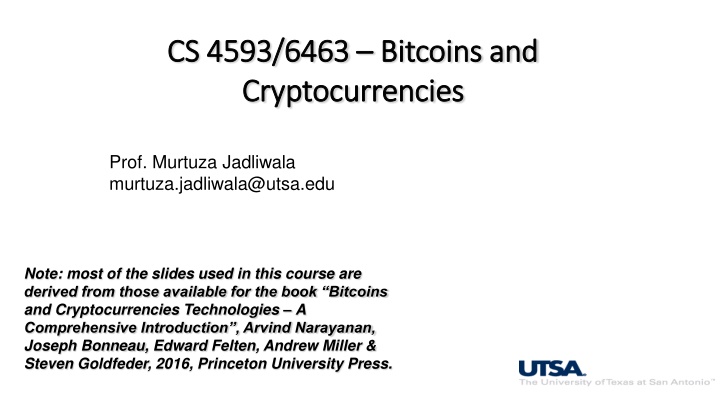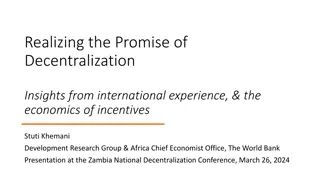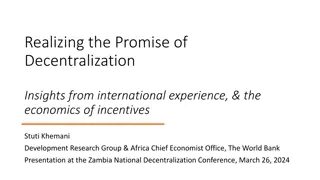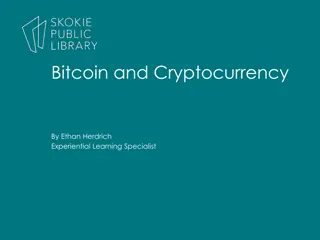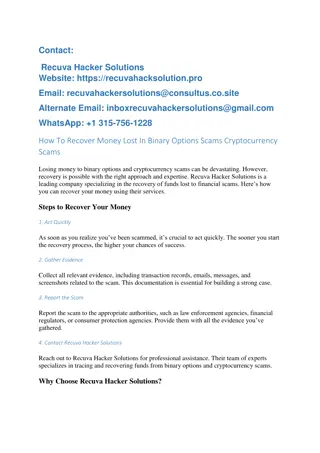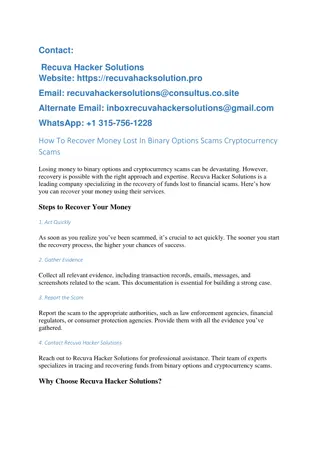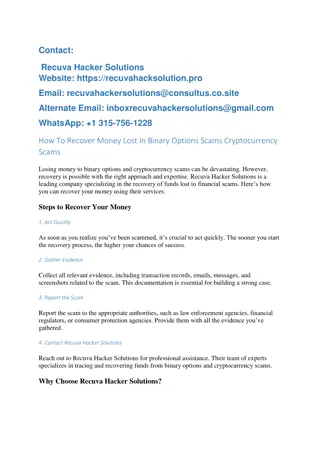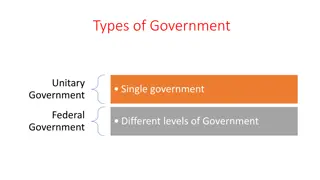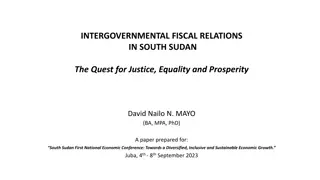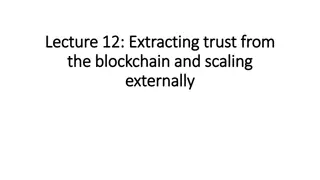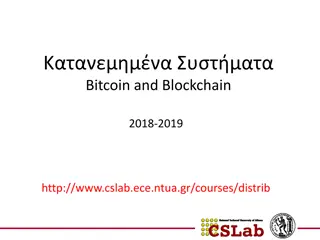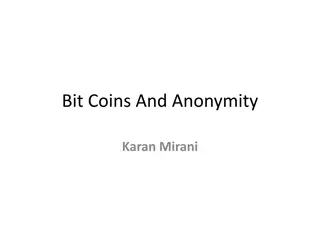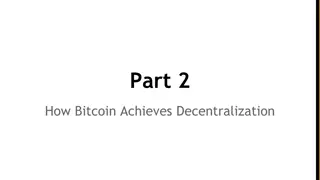Bitcoin Decentralization Overview
Dive into the fundamental aspects of decentralization within Bitcoin, exploring key concepts such as ledger maintenance, transaction validation authority, new bitcoin creation, system rule changes, and the acquisition of exchange value. Understand the decentralized nature of the peer-to-peer network, mining dynamics, and software updates in the Bitcoin ecosystem.
Download Presentation

Please find below an Image/Link to download the presentation.
The content on the website is provided AS IS for your information and personal use only. It may not be sold, licensed, or shared on other websites without obtaining consent from the author.If you encounter any issues during the download, it is possible that the publisher has removed the file from their server.
You are allowed to download the files provided on this website for personal or commercial use, subject to the condition that they are used lawfully. All files are the property of their respective owners.
The content on the website is provided AS IS for your information and personal use only. It may not be sold, licensed, or shared on other websites without obtaining consent from the author.
E N D
Presentation Transcript
CS 4593/6463 CS 4593/6463 Bitcoins and Cryptocurrencies Cryptocurrencies Bitcoins and Prof. Murtuza Jadliwala murtuza.jadliwala@utsa.edu Note: most of the slides used in this course are derived from those available for the book Bitcoins and Cryptocurrencies Technologies A Comprehensive Introduction , Arvind Narayanan, Joseph Bonneau, Edward Felten, Andrew Miller & Steven Goldfeder, 2016, Princeton University Press.
Lecture 2 How Bitcoin Achieves Decentralization
Centralization vs. decentralization Competing paradigms that underlie many digital technologies Centralized: Online Social Networking Services (Facebook, Google) Decentralized: Internet, Email service and the SMTP protocol Decentralization is not all-or-nothing: For example, E-mail. Email has a decentralized protocol (e.g., SMTP), but dominated by centralized webmail services
Aspects of decentralization in Bitcoin Our focus in this chapter 1. Who maintains the ledger? 2. Who has authority over which transactions are valid? 3. Who creates new bitcoins? 4. Who determines how the rules of the system change? 5. How do bitcoins acquire exchange value? Beyond the protocol: Exchanges, Wallet software, Service providers...
Aspects of decentralization in Bitcoin 1. Peer-to-peer network: Open to anyone, Low barrier to entry 2. Mining: Open to anyone, but inevitable concentration of power often seen as undesirable 3. Updates to software: Core developers trusted by community, have great power
Bitcoins key challenge Key technical challenge of decentralized e-cash: distributed consensus or: how to decentralize ScroogeCoin
Why consensus protocols? Traditional motivation: reliability in distributed systems Distributed key-value store enables various applications: DNS, public key directory, stock trades
Defining distributed consensus There are n nodes, each have an input value. Some nodes are faulty or malicious. A distributed consensus protocol has the following two properties: 1. The protocol terminates and all honest nodes are in agreement on the same value 2. This value must have been proposed by some honest node What does this mean in the context of Bitcoins?
Bitcoin is a peer-to-peer system When Alice wants to pay Bob: she broadcasts the transaction to all Bitcoin nodes signed by Alice Pay to pkBob : H( ) Note: Bob s computer may not be in the picture or online! In fact, running a Bitcoin node is not important for Bob to receive the funds. The Bitcoins will be his regardless
What nodes need to reach a consensus on? Which transactions were broadcast on the network Order in which these transactions occurred Result of the consensus protocol: Single, global transaction ledger for the system
How consensus could work in Bitcoin At any given time (in the bitcoin peer-to-peer network): All nodes have a sequence of blocks of transactions (called, ledger or block chain) they ve reached consensus on Each node has a set of outstanding transactions it s heard about (but not yet included in the block chain) For these transactions consensus has not yet happened Each node may have a slightly different outstanding transaction pool
How consensus could work in Bitcoin Tx Tx Tx Tx Tx Tx Tx Tx Tx Tx Tx Tx Consensus protocol Tx Tx Tx Tx Tx Tx OK to select any valid block, even if proposed by only one node
Why consensus is hard (esp. in the Bitcoin context)? Nodes may crash Nodes may be malicious Peer-to-peer network is imperfect Not all pairs of nodes connected (and may participate) Faults in network Latency No notion of global time constraints the set of consensus algorithms that can be used
Many impossibility results Byzantine generals problem: Consensus impossible to achieve if 1/3 or more generals are traitors Fischer-Lynch-Paterson (deterministic nodes): consensus impossible with a single faulty node (under certain conditions)
Some well-known protocols Example: Paxos Never produces inconsistent result, but can (rarely) get stuck
Understanding impossibility results The earlier results proven for specific models Specifically, distributed databases A distributed database model (and assumptions under it) doesn t carry over to Bitcoins! These results say more about the model than about the problem What does it mean? It may be possible to develop consensus protocols that work for Bitcoin networks
Bitcoin consensus: theory & practice Bitcoin consensus works better in practice than in theory Theory is still catching up BUT theory is important, can help predict unforeseen attacks
So why is the problem of consensus different in Bitcoins? Introduces incentives Possible only because it s a currency! So in Bitcoins we do not have to solve the consensus problem in general, but only the one for a currency system Embraces randomness Does away with the notion of a specific starting and ending point for consensus Consensus happens over long time scales about 1 hour In summary, consensus in Bitcoins is not deterministic Even at the end of 1 hour nodes may not be 100% sure that their view of the block chain is the consensus view Although the probability of that not being the case is very low
Consensus without identity: using a block chain Bitcoin s consensus algorithm
Bitcoin nodes dont have long-term identities Why? 1. Identity is hard in a P2P system Sybil attack 2. Pseudonymity is a goal of Bitcoin
Why having identity is useful for consensus? Answer: It makes the consensus protocol easy to design! But how? 1. Pragmatic: some protocols need node IDs Protocols could have instructions of the form Now node with lowest ID, do something.. Without identities, instructions are constrained 2. Security: assume less than 50% malicious If nodes have identities, and difficult to create new node identities then some assumptions about the number of malicious nodes can be made This can be used to prove certain security properties
How to overcome lack of identity in Bitcoins? Weaker assumption: select random node in the bitcoin network Analogy: lottery or raffle When tracking & verifying identities is hard, we give people tokens, tickets, etc. Key assumptions: Now we can pick a random ID & select that node Multiple sybil nodes by the adversary are able to get only a single token (random ID)
Key idea: implicit consensus 1. In each round (corresponds to a different block in the block chain), random node is picked 2. This node proposes the next block in the chain No consensus or voting done by this node! 3. Other nodes implicitly accept/reject this block by either extending it or ignoring it and extending chain from earlier block 4. Every block contains hash of the block it extends
Consensus algorithm (simplified) 1. 2. 3. 4. New transactions are broadcast to all nodes Each node collects new transactions into a block In each round a random node gets to broadcast its block Other nodes accept the block only if all transactions in it are valid (unspent, valid signatures) Nodes express their acceptance of the block by including its hash in the next block they create 5.
Now lets analyze if this works! Assume a malicious adversary. Can this adversary subvert the implicit consensus process by: 1. Stealing Bitcoins? 2. Denial of service? 3. Double spend?
What can a malicious node do? Double- spending attack signed by A CA B Pay to pkB : H( ) signed by A CA A Pay to pkA : H( ) Honest nodes will extend the longest valid branch In practice nodes extend the block that they first detect on the peer-to-peer network (not a solid rule)
From Bob the merchants point of view 1 confirmation 3 confirmations CA B Double-spend probability decreases exponentially with # of confirmations double-spend attempt CA A Hear about CA B transaction 0 confirmations Most common heuristic: 6 confirmations
Recap Protection against invalid transactions is cryptographic, but enforced by consensus Protection against double-spending is purely by consensus You re never 100% sure a transaction is in consensus branch. Guarantee is probabilistic
Assumption of honesty is problematic Can we give nodes incentives for behaving honestly? Can we reward nodes that created these blocks? Can we penalize the node that created this block? Everything so far is just a distributed consensus protocol But now we utilize the fact that the currency has value
Incentive 1: Block Reward Creator of block gets to include special coin-creation transaction in the block choose recipient address of this transaction Value is fixed: currently 12.5 BTC, halves every 210,000 blocks created (or every 4 years at the current rate of block creation) We are now in the third period first period block reward was 50 BTC Block creator gets to collect the reward only if the block ends up on long- term consensus branch! Subtle but powerful trick: Incentivizes nodes to behave in way that will get other nodes to extend their block
Theres a finite supply of bitcoins Total supply: 21 million Block reward is how new bitcoins are created Total bitcoins in circulation First inflection point: reward halved from 50BTC to 25BTC Runs out in 2040. No new bitcoins unless rules change Does that mean that after 2040, nodes will no longer have incentive to behave honestly? Not really! Year
Incentive 2: Transaction Fees Creator of transaction can choose to make output value less than input value Remainder is a transaction fee and goes to block creator (that first puts that transaction into that block) Purely voluntary, like a tip But system will evolve, and will become mandatory, as Block rewards run out
Remaining problems 1. How to pick a random node? 2. How to avoid a free-for-all due to rewards? Everybody may want to run a bitcoin node in order to get this free reward (lock reward and Transaction fee) 3. How to prevent Sybil attacks? An adversary may create a large number of Sybil nodes to subvert the consensus process
Proof of work To approximate selecting a random node: select nodes in proportion to a resource that no one can monopolize (we hope) In proportion to computing power: proof-of-work (Used in Bitcoins) In proportion to ownership of the currency: proof-of- stake (Not used in Bitcoins but a legitimate model used in other cryptocurrencies)
Equivalent views of proof of work 1. Select nodes in proportion to computing power 2. Let nodes compete for right to create block 3. Make it moderately hard to create new identities
Hash puzzles nonce prev_h Tx Tx To create block, find nonce s.t. H(nonce prev_hash tx tx) is very small In other words, H(nonce prev_hash tx tx) < target Output space of hash Target space If hash function is secure (satisfies puzzle-friendliness): only way to succeed is to try enough nonces until you get lucky
Advantage of such a PoW system? It completely does away with the problem of magically picking a random node (to propose a block) Nodes independently compete by attempting to solve hash puzzles Once in a while, one will succeed and propose the next block Result: Such a system is completely decentralized No one gets to decide which node proposes the next block
PoW property 1: difficult to compute Difficulty varies with time As of 2015: difficulty level is over 1020 hashes/block i.e., size of target space <= 1/1020size of hash s output space Such a computation not possible with commodity laptops Only some nodes bother to compete miners This process of repeatedly solving hash puzzles is called bitcoin mining Technically anyone can mine mining ecosystem however mining power is concentrated in a
PoW property 2: parameterizable cost Nodes automatically re-calculate the target (size of target space as a fraction of the output space) every two weeks Goal: average time between blocks = 10 minutes In other words, recalculation takes place after 2,016 blocks! Prob (Alice wins next block) = fraction of global hash power she controls
Why is such a re-adjustment needed? It is inefficient if blocks are proposed too close to each other Would not be able to put multiple transactions in a single block! Why 10 minutes? Not significant! Can change it to 5 minutes, and system would still work
Key security assumption Bitcoin attacks infeasible if majority of miners weighted by hash power follow the protocol (or are honest) This will ensure a more than 50% chance that the next block is proposed by a honest node!
Solving hash puzzles is probabilistic 10 minutes Probability density Time to next block (entire network)
PoW property 3: trivial to verify Nonce must be published as part of block Other miners simply verify that H(nonce prev_hash tx tx) < target Advantage? No centralized verifier needed! Any node or miner can verify that the block was correctly mined
Mining economics mining cost (hardware + electricity cost) If mining reward (block reward + Tx fees)> Profit Complications: Fixed (hardware) vs. variable (electricity) costs Reward depends on rate at which miners propose blocks (ratio of their hash rate to the global hash rate) Cost in dollars, but reward in BTC profit depends on exchange rate Solving more than 1020 hashes to obtain 12.5 BTC at current exchange rate is profitable!
Recap Identities Block chain & consensus Transactions Hash puzzles & mining P2P network
Bitcoin is bootstrapped security of block chain health of mining ecosystem value of currency
